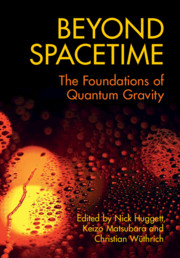Book contents
- Frontmatter
- Contents
- List of Contributors
- 1 Introduction
- Part I Spacetime Emergence
- 2 The Bronstein Hypercube of Quantum Gravity
- 3 Emergence of Time in Loop Quantum Gravity
- 4 Beyond Standard Inflationary Cosmology
- 5 What Black Holes Have Taught Us about Quantum Gravity
- Part II Time in Quantum Theories of Gravity
- Part III Issues of Interpretation
- Index
5 - What Black Holes Have Taught Us about Quantum Gravity
from Part I - Spacetime Emergence
Published online by Cambridge University Press: 24 April 2020
- Frontmatter
- Contents
- List of Contributors
- 1 Introduction
- Part I Spacetime Emergence
- 2 The Bronstein Hypercube of Quantum Gravity
- 3 Emergence of Time in Loop Quantum Gravity
- 4 Beyond Standard Inflationary Cosmology
- 5 What Black Holes Have Taught Us about Quantum Gravity
- Part II Time in Quantum Theories of Gravity
- Part III Issues of Interpretation
- Index
Summary
In this article I review the reasons why gravity has proven much more difficult to quantize than the other forces. Primary among them is the existence of black holes, whose remarkable properties tell us that a theory of quantum gravity must have a mathematical structure that is quite different from the quantum field theories that describe the rest of particle physics. These observations motivated the introduction of the ‘holographic principle’, which argues that the fundamental degrees of freedom in a gravitational theory must live in a lower number of dimensions than the general relativity theory that it reduces to at low energies. The AdS/CFT correspondence gave the first sharp example of how this can be possible, and more recently several ‘toy models’ of this correspondence have been introduced that clearly illustrate not just how holography can be realized but also why it must be. This article gives an overview of these recent developments.
Information
- Type
- Chapter
- Information
- Beyond SpacetimeThe Foundations of Quantum Gravity, pp. 105 - 114Publisher: Cambridge University PressPrint publication year: 2020
